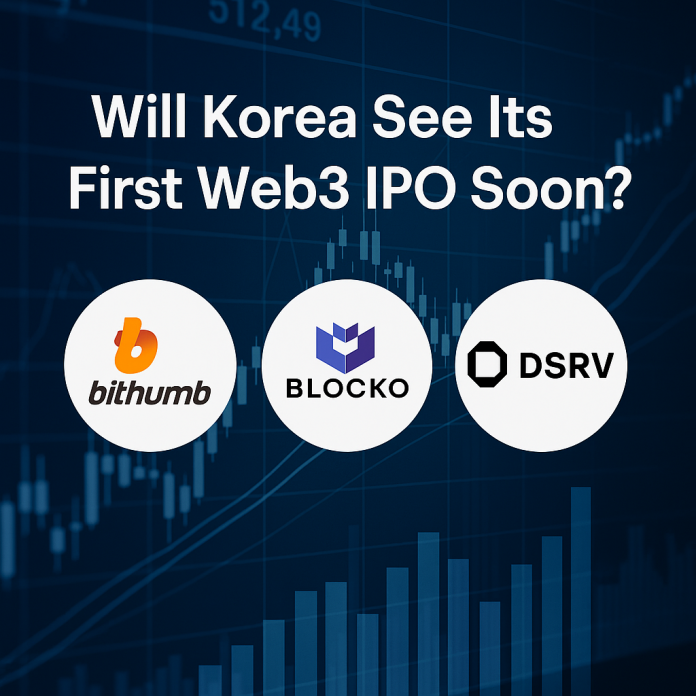
As the global digital asset industry matures, companies rooted in Web3 are beginning to enter traditional financial markets through IPOs. In the U.S., Circle—issuer of the USDC stablecoin—recently made headlines by listing on the New York Stock Exchange (NYSE). Its stock surged 168% on the first day and climbed nearly 247% within two trading sessions, pushing its market valuation into the billions.
In contrast, South Korea has yet to witness the IPO of a pure Web3-native company. To date, Korean companies engaged in blockchain have mostly been traditional firms (e.g., gaming, fintech, or cybersecurity) that later integrated blockchain elements. However, this may soon change.
The Race Begins: Korea’s Top 3 Web3 IPO Candidates
Three firms are currently seen as frontrunners in Korea’s Web3 IPO scene: Bithumb, Blocko, and DSRV.
-
Bithumb, one of Korea’s largest crypto exchanges, is preparing for a KOSDAQ listing in early 2026, with Samsung Securities as its underwriter. Originally targeting a late 2025 IPO, the timeline was pushed back due to delays in a planned spin-off between its exchange and non-exchange business units.
-
Blocko, an enterprise blockchain solutions provider, is pursuing a tech-special listing route. It has entered the technical evaluation phase required for this path, and based on typical timelines, may file for preliminary review within the second half of the year.
-
DSRV, a blockchain infrastructure firm providing cloud and validator services, is also preparing to list. The company meets KOSDAQ’s revenue requirements and is working with Daishin Securities as its IPO lead. Unlike many validator-based firms, DSRV is known for its stable, B2B-oriented business model.
Regulatory and Structural Hurdles Remain
Despite growing momentum, several challenges remain. Bithumb’s corporate governance is one concern. Legal disputes surrounding former chairman Lee Jung-hoon and questions over shareholding structure have drawn scrutiny from financial authorities. The Financial Supervisory Service (FSS) is reportedly conducting an on-site inspection.
Additionally, Korea’s current regulatory frameworks are not well-suited to assess token-based or decentralized business models. Traditional accounting and evaluation methods often fail to capture the unique characteristics of Web3 companies.
A Defining Moment for Korea’s Web3 Ecosystem?
As countries like the U.S., Japan, and EU move forward with regulatory clarity and open paths for digital asset firms to go public, Korea may soon follow suit. The IPO of a Web3-native company would mark a turning point—not just as a funding milestone, but as a signal of public legitimacy and institutional acceptance of Web3 business models.
To reach that milestone, Korea’s aspiring Web3 IPO pioneers must demonstrate not only technological capability, but also legal transparency, governance maturity, and adaptability to evolving compliance standards.






